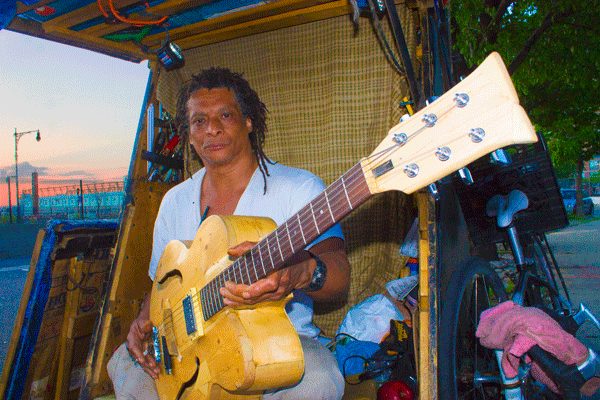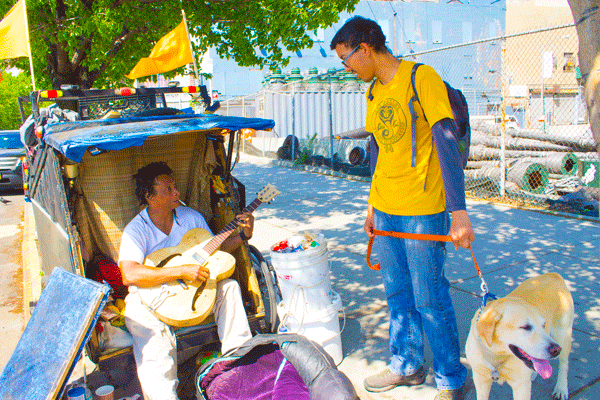
BY ZACH WILLIAMS | Musician and craftsman Randy Morris makes his home and work alike on a nondescript stretch of curb alongside the West Side Highway, a few hundred feet north of the newly opened Whitney Museum.
An unyielding desire for workspace brought him there after several years spent in residence at a transitional housing facility in the East 20s through the city’s Housing First homelessness strategy. In its harsh realities and isolation, life on the streets is hardly romantic — but in the case of Morris a purpose arose. Scraps of wood make guitars. Likewise, they form the skeleton of his handmade trailer home. Collecting bottles and cans earns the dough to buy what cannot be found in the streets of the Meatpacking District.
Once upon a time he had a family, a daughter, and a business. He has not spoken to them for many years, said Morris, who did not offer reasons. But he has music and a knack for building with his own two hands. As he approaches his 60th birthday, he realizes that opportunities for a new life are diminishing — though he retains the mindset that with a specific type of help, he could emerge from his current station in life.
“I just need that little jump start…other people’s things make me want to have them (but) by my own hands,” he said in an interview on May 17 while practicing a song entitled “Once I Loved Before.”
He hardly enjoys living on the streets — but the solitude and space of his curbside homestead enables him to live on his own terms. That means working without the restrictions accompanying a more standard domicile where his work has previously led to conflict with landlords and neighbors alike. He still dreams of securing the combination of shop and home that has eluded him for two decades.
“I’d rather have a workshop with a bed than an apartment,” he said. His words and actions indicate he will readily take his chances on the streets in the absence of such an ideal situation.
That is precisely what happened in the mid-1990s when he lost a bicycle shop on Eighth Ave. in Chelsea to the pressures of business and a romance gone sour. He previously had another shop in the neighborhood, as well in Tribeca on Franklin St., he said. But he decided to pursue his work in the only way that seemed available after his last business closed.
“I made another guitar and decided to do the homeless thing,” he said.
Over the years he has made about 20 guitars with evolving acumen. Some he sold. Some he lost. His newest electric “jazz box” features the pickup and tail piece of an Ibanez guitar with the neck and fretboard of an unknown, cheaper brand. The rest mostly comes from discarded bits of wood found during scavenging hunts, resulting in a striped formation of different grains. Smaller pieces fill the gaps created by the curvatures of the body.
He created the trailer as well without the aid of power tools. The lack of a workbench is another reason for improvisation. Carving and other precise work requires the aid of a nearby tree or a trusty foot for the purposes of rigidity. Conscious of the need to keep the place tidy, his tools and possessions all fit into the 20 square feet within the trailer he made. It has enough space to sleep and keeps him comfortable enough with the aid of a tarpaulin installed up top and insulation created from cardboard screwed into a wooden framework forming a hollow wall.
A small stack of grey bricks serves as a stove where he cooks with the aid of a blowtorch. He seldom ventures far from camp lest it appear abandoned and subject to confiscation by the city, or robbery by others on the streets. Unlike many of them, Morris does not struggle with drug abuse, alcoholism, or mental illness, he said. Nonetheless, the resulting stereotypes of homeless are true, he added, necessitating that he follow a code of behavior that differentiates himself from them. Otherwise, he could be forced to leave the area and start all over again.
Asking for money is not his method of operation though he accepts offers. He’ll offer comments to pretty passing ladies in the same friendly manner he gives to anyone. Most passersby ignore him, but the neighborhood regulars will stop by for a chat. Yellow cab driver Bill Kafentzis stopped by on May 17 to offer him a bit of banter, a pack of Maverick brand cigarettes and some snacks. There was a lead on another project guitar, he told Morris. Every 15 minutes or so another person greets him, whether a local dog walker, resident or trucker driving his rig on the highway.

But other times Morris said he feels like the object of curiosity from interested pedestrians who refrain from directly communicating.
“This is like ‘I’m going to get your attention and then pretend you’re not here,’ ” he said.
Morris remains sensitive to the notion that others find their own purposes in his plight. About five years ago he was a much-cited example of the success of a city nonprofit, which arranged housing for him. His talent with the guitar and personality made a good impression on donors eager to support a different approach to battling homelessness. Yet, the emphasis on getting him to live in an apartment neglected that one central truth of Morris — who desires above all to have a dedicated space for his craft, he said.
So he remains alongside the West Side Highway, and is waiting for help. In the meantime he remains confident that what he has and wants ranks higher in importance than material comfort.
“That’s good for some people. I have no problem with that, but for someone like myself I am a complete package. Just because I am not making lucrative income off of what I do does not mean that I am not a complete package…Unfortunately, I am not able to exercise my abilities and talents because I am not facilitated to do that here on the sidewalk.”

































